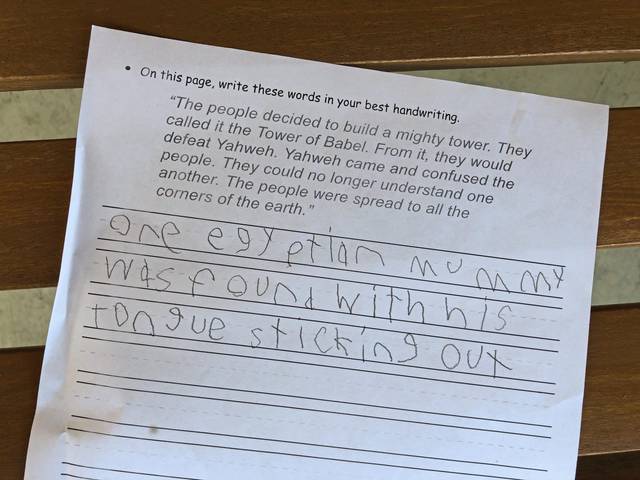Exposure to covid-19 wasn’t Aasta Deth’s concern for her two young children on the first day of school. Exposure to religion in their public school curriculum was.
Deth, who lives in Harrison, said she found religious and faith-based content in both her 5-year-old daughter’s online kindergarten program and 8-year-old son’s third-grade social studies course offered through Highlands School District.
“It disturbed me because it has no place in public school,” she said. “Public school is meant to be secular. I was upset the school bought into a program that had religious undertones.”
In an emailed statement in response to requests for comment, Highlands Superintendent Monique Mawhinney said the program is not religion-based and aligns with state academic standards. The company providing it also denies it is religious.
Deth enrolled both of her children in the Highlands Virtual Academy because it was the only fully online option available. The district is using a hybrid program in which students are split into groups where they are in school two days a week and learning from home the other three.
As a recent cancer survivor, Deth said, “It was really important to me. I wasn’t comfortable sending them back into a school environment yet.”
Mom troubled by passages
Highlands is using Accelerate Education for its elementary virtual program. In it, Deth said, she came across a suggestion for her 5-year-old to begin her day by lighting a candle and saying a prayer; for her son, there was a writing assignment to copy in his best handwriting what she called a Bible verse about the Tower of Babel.
The paragraph reads, “The people decided to build a mighty tower. They called it the Tower of Babel. From it, they would defeat Yahweh. Yahweh came and confused the people. They could no longer understand one another. The people were spread to all the corners of the earth.”
“There is no gray area here,” she said. “This is just a religious lesson.”
It prompted Deth to look through her son’s social studies lessons for the entire year.
“Every single social studies lesson I felt did have a faith-based slant to it,” she said.
Culture or religion?
In her statement, Mawhinney said students in the Accelerate third-grade social studies program explore the basic fundamentals of social studies including world history, geography, culture and American history.
“Learners begin by looking at the beginning of civilization and examining the ancient Hebrew civilization, the Phoenicians and the Kush tribe of ancient Africa,” Mawhinney wrote. “The first lessons in the first module are about ancient Hebrew cultures. The activities of the lessons focused on storytelling, comprehension, summarization, handwriting and pictorial representation of content.
“The ancient Hebrew culture lessons may have conflicted with a particular family’s views; however, the module does indeed align with the Pennsylvania academic standards for geography and history,” she wrote. “As the district moves forward, it will assure the lessons are being reviewed in advance to assure any subjective content is not assigned to students.”
Did Highlands remove the program?
Deth said the entire third-grade social studies program was quietly removed the day after she emailed the teacher, the elementary principal and the director of the virtual academy.
A district teacher is now handing the course, she said.
Mawhinney did not respond when asked whether or not the district is still using the Accelerate third-grade social studies program.
Deth said she got various responses from district officials — the teacher apologized, the principal said it would be looked into, and the academy’s director said they had no idea. Deth said the teacher claimed the program had been removed because it was deemed to be “too advanced” for third grade.
Who’s minding the curriculum?
Deth said she reached out to school board President Bobbie Neese, who she said responded by saying it was the teacher’s job to review the curriculum for anything inappropriate.
Deth disagrees.
“That’s a due diligence the district should have done before buying the program,” she said. “It was the first lesson on the first day. Someone should have opened it up to see what the lesson was.”
Neese did not respond to requests for comment.
Board members Debbie Beale and Kristie Babinsack said they had not heard about the issue.
Deth said she found a connection between Accelerate Education and Alpha Omega Publications, a Christian homeschool program. She said Highlands should have gone with a secular company instead.
“I just don’t think that a company that specializes in Christian homeschooling can create a program that’s truly unbiased,” she said.
Alpha Omega and Edgenuity are both owned by Weld North Education, but do not share curriculum, said Deborah Rayow, vice president of instructional design and learning science with Edgenuity, based in Scottsdale, Ariz. Edgenuity is partnered with Accelerate Education to provide curriculum to elementary schools through Edgenuity.
Highlands uses Edgenuity at the middle and high school levels.
Rayow said the Accelerate social studies program is not religious or faith-based, but she understands Deth’s concerns.
“We would never want a faith-based curriculum in a public school and we would never offer that,” she said.
Company: Culture through story-telling
Rayow said a focus of the second- and third-grade program is learning about other cultures, including ancient Chinese, Mali, Celtic and Hebrew.
“The primary vehicle for learning about cultures in the Accelerate Education curriculum is storytelling,” she said. “When they read about ancient Hebrew culture, the two stories that they read are Joseph and the Many Colored Coat and a story about the Tower of Babel. They are presented as stories.
“Many ancient cultures have religious themes and elements in their stories, and that’s true here, too,” she said. “The Accelerate Education curriculum is very clear that these are stories, and that stories are a way to learn about other cultures.”
The suggestion Deth saw about her daughter starting a day by lighting a candle and saying a prayer came from a lesson about family traditions, Rayow said. The paragraph presented to Deth’s son was a summary of a story and not a Bible verse, she said.
Deth said the material was not being presented as stories or culture, but as historical fact.
Vow to give parents context
Rayow said they are reaching out to Accelerate to provide more context for parents about why their children are reading the stories.
“Context is key here,” she said. “It’s something we’ll work with them to do a better job of.”
Deth said she doesn’t think Highlands did anything purposeful or malicious, but she would have appreciated more communication from the district.
“I think they just didn’t look at it,” she said. “I wish they would have been more open with the parents.”
Deth said the district should let parents know it has reviewed the rest of the Accelerate program to ensure there is no faith-based material in it.
“That’s all I want,” she said. “I don’t know how much I trust the Accelerate program anymore. Every lesson I’m reading before I give it to my kids.”
Editor’s note: The Accelerate Education virtual curriculum is not owned by Weld North Education. An original version of this story incorrectly said that it was.











